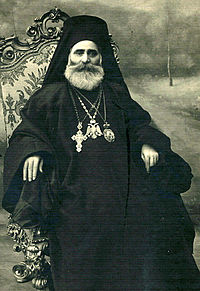Council of Constantinople (1923)


The Council of Constantinople of 1923 was a meeting of representatives of several local Eastern Orthodox Churches held in Constantinople from 10 May to 8 June 1923, convened at the initiative of Ecumenical Patriarch Meletius Metaxakis. In spite of being called by some as the "Pan-Orthodox Council of Constantinople of 1923", or otherwise referred to as "pan-Orthodox" or as an "ecumenical council", the council is not recognized as an ecumenical council: "Calling the 1923 Council 'ecumenical' cannot be accepted, since representatives of the Alexandrian, Antiochian, Jerusalem and most of the other Local Churches did not participate in its work."[1]
The primary topic of the Council of 1923 was calendar reform. The Roman Catholic Church and almost all of Western Europe completed their switch from the Julian calendar to the Gregorian calendar, the current international standard, during the 16th century.[2] Russia, and the rest of the Orthodox world, however, remained on the old calendar until this council. At this council, the Greek Orthodox Church, Russian Orthodox Church, and many other branches of the Eastern Orthodox Church adopted the new calendar, which they called "the new Julian calendar", which corresponds with the Gregorian calendar until 2800.[3]
This council is extremely controversial within Eastern Orthodoxy—it led to many schisms in many autocephalous churches of different Old Calendarist groups.[4][5] Even academic sources note the controversy of this council.[6]
The acts and decisions of this council were first translated into English only in 2006, by the Rev. Dr. Patrick Viscuso.[6]
Sources[edit]
- Viscuso, Patrick Demetrios (2006). A Quest for Reform of the Orthodox Church: The 1923 Pan-Orthodox Congress—an analysis and translation of its acts and decisions. Foreword by Demetrios Constantelos. Berkeley, California: Patriarch Athenagoras Orthodox Institute InterOrthodox Press. pp. 1–205. ISBN 978-1-932401-09-7. OCLC 71778926.
References[edit]
- ^ Skobei, Grigori Nikolaevich (2005). "Всеправославный собор" [Ecumenical council]. Orthodox Encyclopedia (in Russian). 9: 683–685. Retrieved 30 March 2022.
- ^ Hellmut, Gutzwiller (15 January 2018). "Calendriers" [Calendars]. Historical Dictionary of Switzerland (in French). Translated by Anne Berlincourt. Retrieved 30 March 2020.
- ^ Photius of Triaditsa (January 1994). "The 70th Anniversary of the Pan-Orthodox Congress, Part I of II". Orthodox Life. Vol. 1994, no. 1. pp. 40–42. Retrieved 30 March 2022 – via The Orthodox Christian Information Center.
- ^ Photius of Triaditsa (March 1994). "The 70th Anniversary of the Pan-Orthodox Congress, Part II of II". Orthodox Life. Vol. 1994, no. 2. pp. 38–46. Retrieved 30 March 2022 – via The Orthodox Christian Information Center.
- ^ Vasilevich, Natallia; Paert, Irina; Shishkov, Andrey (10 November 2021), "How the Pan-Orthodox Congress in Constantinople (1923) has Broken Orthodoxy", Uni Tartu School of Theology and Religious Studies Channel (YouTube video), University of Tartu, gv2Icrk4Rs0, retrieved 30 March 2022
- ^ a b Stamatopoulos, Dimitrios (2008). "Book review of Viscuso 2006". Journal of Modern Greek Studies. Vol. 26. Johns Hopkins University Press. pp. 518–521. doi:10.1353/mgs.0.0025. ISSN 1086-3265. S2CID 143973993.
